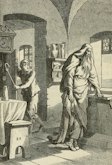The Cowherds
A fairy tale by Ludwig Bechstein
Once a wanderer was crossing a meadow when he heard, in the distance, a strange hollow cry in the reed-bed, with one cry sounding after another, as if an ox were bellowing; and he was at a loss to explain what animal the sound was issuing from or what it signified. After a while the wanderer came upon two old cowherds who were watching their herds, as neighbours, on the wide meadow. The wanderer asked them what the sound meant.
One of the old cowherds answered, “I’ll tell you. What’s calling like that in those reeds, it’s the bittern, or mire-drum as it’s also called.”
“Oh, he has no end of names,” the other old cowherd added. “He also goes by First Cow, Moorcow, and Mosscow. In ancient times this same boomer was a shepherd boy, but a dreadfully lazy one, so he was changed into a bird; and this annoys him so much that he booms all the time, but particularly in the night, when he thrusts his bill into the water and bellows like a bull, so loud you can hear him a league away, and that’s how he announces rain.”
“Selt’s right,” the first cowherd spoke again, “but there’s another tale about the boy. There were two cowherds, like there are two of us, but the two of them weren’t together. The one watched his cows in the fertile green meadows in the vale, the other on a high, barren mountain. As a result, the first one’s cows on the flowery meadow became very bright and brisk and yielded milk aplenty, but the cows of the cowherd on the mountain, where the Lord does make grass to grow, but takes His time about it – as that schoolmaster sang in the collect[29] – and where the wind plays with sand more than with flowers, they became very weak and very skinny and gave little milk, and all of that was sky-blue, as they had seen more blue sky than green grass.
“One evening, when both cowherds wanted to drive their herds home, the bright and brisk cows in the fertile meadow had no desire to go home, and among their number there was a many-hued cow who ran away in the opposite direction, and the other cows all followed her, so the cowherd cried at the top of his voice: “Huey, come! Huey, come!” but all his shouting was of no use. Now, as for the skinny cows of the cowherd up on the mountain, they had lain themselves down from hunger and exhaustion and did not want to get up or, in fine, they couldn’t, so the cowherd shouted with all his might: “Hup! hup! hup! hup!” meaning that they should rise, but they did not get up, because they could not; and now the cowherd down below and the one up above were shouting, as if to see who could shout the loudest, the one “Huey, come! Huey, come!” and the other, “hup! hup! hup!” night and day, and day and night, until the breath left their bodies and their souls passed out from their throats, and then they both became birds: the meadow-herd became a bittern and the mountain-herd a hoopoe, and they continue their cries to this day.”
Such a tale did the cowherd tell the wanderer, and he now knew the meaning of the rumbling in the reed-bed, and when he heard the cry hup! hup! hup! sounding down from a mountain, he also knew what kind of bird was calling in this way, one that already has a bad reputation, namely the devil’s lackey and devil’s verger, that bird called the hoopoe.
The New Book of German Fairy Tales

Notes: Translated by Dr. Michael George Haldane.
Contains 50 fairy tales.
Author: Ludwig Bechstein
Translator: Dr. Michael George Haldane
Published: 1856